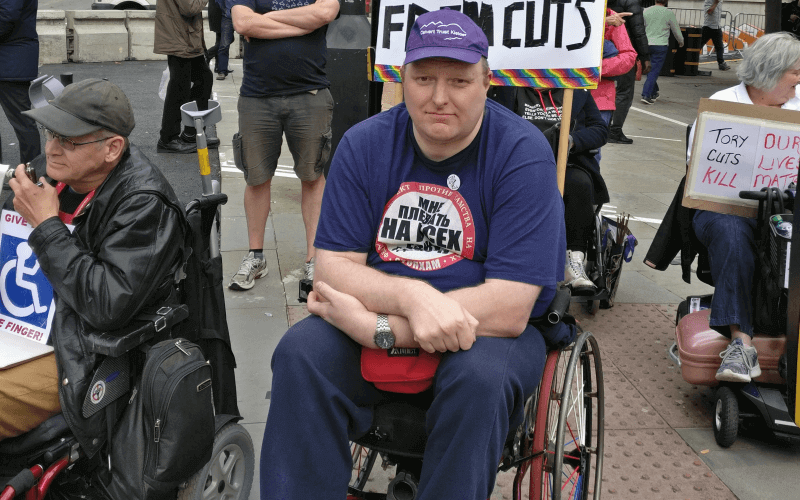Legislation passed by parliament this week will give disabled people new rights when travelling by taxis or private hire vehicles, although there are already concerns over how well they will be enforced.
The private members’ bill aims to fill gaps in the protection given to disabled people under sections 165 and 167 of the Equality Act 2010.
One of the gaps concerns laws that impose fines of up to £1,000 on drivers of taxis and private hire vehicles who refuse to accept wheelchair-users, try to charge them extra, or fail to provide them with appropriate assistance.
But those laws – finally brought into force in 2017 following delays from successive governments – only apply in those areas of England, Scotland and Wales where a local authority has drawn up a list of all the wheelchair-accessible taxis and private hire vehicles in their area.
The new taxis and private hire vehicles (disabled persons) bill, originally introduced by Conservative MP Jeremy Wright, the former culture secretary, will now force all local authorities to maintain and publish such a list.
But it will also impose new duties on drivers of vehicles that are not wheelchair-accessible to carry a disabled person and their mobility aid and provide “reasonable assistance”, without charging extra, for example if a wheelchair-user wants to transfer to the passenger seat and store their wheelchair in the boot of the vehicle.
The Equality Act already bans operators of private hire vehicles from refusing a booking because the passenger will be accompanied by an assistance dog, but the new legislation will also now prevent them refusing bookings from any disabled person because of their impairment, or from charging them extra for providing them with assistance.
The junior transport minister Baroness [Charlotte] Vere said this week that the government had given the bill its “full support” and that it “goes a long way” to reducing the impact of discrimination on disabled people, who “rely on taxis and private hire vehicles more than most”.
Transport access campaigner Doug Paulley (pictured), who has fought for years to highlight gaps in the legislation and its enforcement, welcomed the new bill and the strengthened rights it offered.
But he said the problem with the bill was that it relied on existing enforcement mechanisms.
He said: “By making it a criminal offence for taxi drivers to discriminate against us in various ways, parliament clearly intended to make it easier and more effective to enforce – but in fact the number of such prosecutions, compared to the number of such incidents, makes it very clear that this legislation is not enforced and discrimination is rife.
“The postcode lottery is a massive factor, with different taxi licensing authorities having very different competence, policy and energy in this area.
“Bringing other disabled people up to the same protection wheelchair and assistance dog users currently have is a very low bar indeed!”
Lord [Patrick] McLoughlin, who introduced the bill in the Lords, was partly responsible for the delay in implementing sections 165 and 167 as he was transport secretary between 2012 and 2016.
He said earlier this month that the new private members’ bill was “intended to give disabled people legal rights to ensure that travelling by taxi or private hire vehicle need no longer be a source of anxiety, physical discomfort or embarrassment – or a case of not being able to travel at all”.
The disabled Liberal Democrat peer Baroness [Sal] Brinton told fellow peers earlier this month that her party supported the bill, although its scope was “limited”, and that it was “long overdue that disabled passengers are not charged more than other passengers”.
She said there was still a serious issue – outside London – with the shortage of wheelchair-accessible taxis and private hire vehicles.
She added: “It is important that these steps are taken to go forward, but we need to be careful in thinking that this is going to be a universal answer to the access issues that disabled people face in getting taxis and private hire vehicles.”
A note from the editor:
Please consider making a voluntary financial contribution to support the work of DNS and allow it to continue producing independent, carefully-researched news stories that focus on the lives and rights of disabled people and their user-led organisations.
Please do not contribute if you cannot afford to do so, and please note that DNS is not a charity. It is run and owned by disabled journalist John Pring and has been from its launch in April 2009.
Thank you for anything you can do to support the work of DNS…

 Making all self-driving pilot schemes accessible would be ‘counter-productive’ and slow us down, says minister
Making all self-driving pilot schemes accessible would be ‘counter-productive’ and slow us down, says minister Government’s ‘weak’ response to damning transport access report puts right to travel in ‘grave danger’
Government’s ‘weak’ response to damning transport access report puts right to travel in ‘grave danger’ Self-driving taxis that are not accessible will be allowed pilot scheme licenses, government suggests
Self-driving taxis that are not accessible will be allowed pilot scheme licenses, government suggests